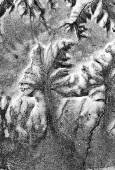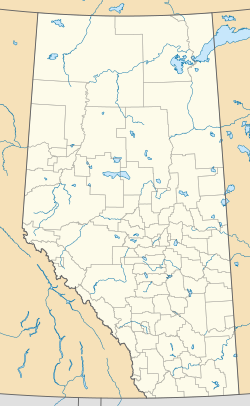The Badlands Guardian is a geomorphological feature located near Medicine Hat in the southeast corner of Alberta, Canada. The feature was discovered in 2005 by Lynn Hickox through use of Google Earth.[1]
Badlands Guardian | |
|---|---|
Geomorphological feature | |
 Badlands Guardian in 1938, before the creation of the road that resembles the earphones | |
| Coordinates: 50°00′38.20″N 110°06′48.32″W / 50.0106111°N 110.1134222°W | |
| Location | Near Medicine Hat, Alberta, Canada |
| Formed by | Erosion |
| Dimensions | |
| • Length | 255m |
| • Width | 225m |
Description
editViewed from the air, the feature has been said to resemble a human head wearing a full Indigenous type of headdress, facing directly westward. An additional road (Township Road 123A) and an oil well have been said to resemble a pair of earphones worn by the figure,[2][3] which were installed in the early 2000s[4] and are expected to disappear once the oil well is abandoned.[5]
The head is a drainage feature created through erosion of soft, clay-rich stratum by the action of wind and water.[2][6] The arid badlands are typified by infrequent but intense rain-showers, sparse vegetation and soft sediments. Although the image appears to be a convex feature, it is actually concave – and therefore, a valley,[7][8] and is an instance of the Hollow-Face illusion. Its age is estimated to be in the hundreds of years at a minimum.[5]
In 2006, suitable names were canvassed by CBC Radio One program As It Happens. Out of more than 140 names submitted, seven were suggested to the Cypress County Council. They altered the suggested "Guardian of the Badlands" to become "Badlands Guardian".[6]
The Badlands Guardian was also described by the Sydney Morning Herald as a "net sensation".[2] PCWorld magazine has referred to the formation as a "geological marvel".[9] It is listed as the seventh of the top ten Google Earth finds by Time magazine.[8]
See also
edit- Apophenia, the tendency to perceive connections between unrelated things
- Pareidolia, the phenomenon of perceiving faces in random patterns
- "Face on Mars", photographed by Viking 1 in 1976
- Inuksuk, traditional Native Arctic peoples' stone "marker statuaries" in Alaska and Arctic Canada
- Marcahuasi, a plateau in the Andes, near Lima, Peru with numerous rock formations with surprising likenesses to specific animals, people, and religious symbols.
- Old Man of the Mountain, (former) rock profile in New Hampshire (collapsed on May 3, 2003)
- Old Man of Hoy, a rock pillar off Scotland that resembles a standing man
- Sheep Mountain (Teton County, Wyoming), a mountain in Wyoming that resembles a sleeping Native American
References
edit- ^ Danielle, Nerman (Sep 22, 2016). "Atlas Obscura names Alberta's 'Badlands Guardian' curious, hidden wonder". CBC News.
- ^ a b c Sydney Morning Herald Article by Stephen Hutcheon: "Gran's canyon is a net sensation" November 13, 2006
- ^ Randall Stross (23 September 2008). Planet Google: One Company's Audacious Plan to Organize Everything We Know. Free Press. pp. 142. ISBN 978-1-4165-8047-8. Retrieved 6 September 2013.
The Badlands Guardian, for example, a natural geologic formation near Alberta, Canada, was often visited by online aviators. It resembles a human head, wearing Native American headdress—and also appears to be naturally adorned with ...
- ^ "Google Timelapse". earthengine.google.com. Retrieved 2022-09-05.
- ^ a b "The Badlands Guardian". Canada.com. April 5, 2007. Archived from the original on March 28, 2014.
- ^ a b "Alberta's Aztec Rocker?". CBC.ca. Archived from the original on Jan 16, 2009.
- ^ As It Happens 3D rendering by CBC Radio [dead link]
- ^ a b Fletcher, Dan. "Top 10 Google Earth Finds: A Face in the Clay". Time.
- ^ Spring, Tom (Jul 9, 2007). "In Pictures: The Strangest Sights in Google Earth". PC World. Archived from the original on Apr 22, 2012.
